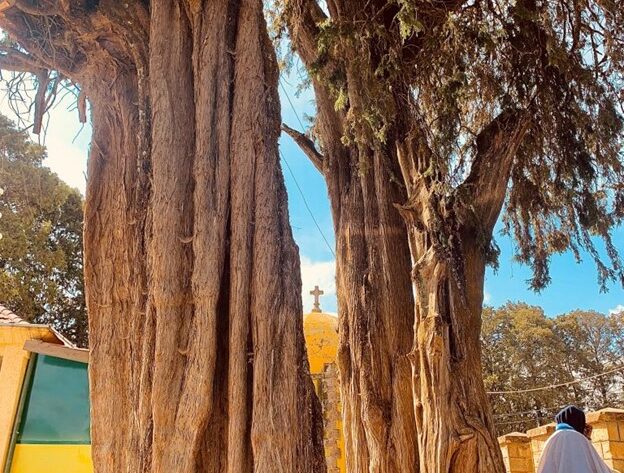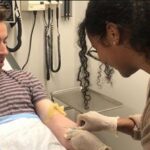Abyssinia, the only African nation to successfully resist European colonization, the original home of coffee, the land close to the hearts of Rastafarians worldwide , and in in my opinion, the nation with some of the most beautiful people in the world (I mean, honestly)… This week we travelled 5,140.3 km from Nigeria to our next stop Ethiopia! Good thing we have our guide to #medlife in Ethiopia, Bethel, to show us the ropes! Let’s go!
1. Introduce yourself! BA: My name is Bethel Ayele (kecho_3e7i). I am a 23 years old Ethiopian medical student studying at Jimma University in Ethiopia. Life in Ethiopia is colorful- the cultures, food, music, religion, holidays, nature.. And the people are friendly and welcoming.

2. Why did you choose medicine? Or did medicine choose you? BA: Medicine was my first choice. The science is really interesting and not just that, but it gives back to the community. The satisfaction after helping a patient… watching them walk away relieved.. Is beyond anything. With all its ups and downs medicine does have it’s silver lining.
3. Did you always want to study medicine in Ethiopia? What’s the story there? BA: Actually I decided to learn medicine on my last year of high school. And even though I had seen and read about a number of universities and systems abroad, I never really applied to any of them. I didn’t plan it out, but my actions and choices led to me studying medicine in Ethiopia.
4. How do you apply for medical school in Ethiopia? BA: In Ethiopia we don’t apply for the medical schools directly. It is the government that places us in different universities and fields of study based on our grades on the national exam we take at the end of the last year of highschool. After we take the exam we list down our preference in both universities and fields and grades determine the rest. Medicine during our time demanded for higher grades and that was how I got in. As for international students, they can apply to any of the well known medical schools here.
5. What does medical school entail there? BA: Medical school here takes 6 years. That is one semester of premed, two years of preclinical, two and a half clinical years and one year of internship.

6. What’s the normal professional trajectory after graduating from medical school in Ethiopia? BA: Like most of us already know, after graduating from medical school, there are a number of things one can do: like continue as a GP (general practitioner), take an exam for residency and specialize, work on public and global health and many more. And it’s no different here. Most go for residency though.
7. What does a normal day look like for you? BA: A normal weekday for me is- I wake up at 7am go to morning session which starts at 8am for about an hour. From 10am-12pm I’ll be at the inpatient care/ward session, having brief lecture with a senior doctor (or as they call it on most medicine related movies an attending physician) or a resident, maybe even presenting my cases at times. Then I go back to dorm and have lunch. If I have seminar at 2pm I’ll be heading to that, and it usually lasts for an hour or an hour and thirty minutes. If I don’t, I sleep till 4pm. Then I’ll go to inpatient care/ward to take medical history and do physical examination on a patient assigned to me. Then after I have dinner I go to the library, write and compile what I got from my patient, study my case and other related things. At around (plus minus) 12am I go back to dorm and sleep. On Friday, the afternoon is for some me time. Saturday and Sunday usually depends on what I got going on the coming week- like duties, bedsides, seminar presentations…But mostly I spend it like a normal med student.. Studying and storing energy for the coming week.
8. What do you do to destress? BA: I don’t stress as much.. Or so I try not to.. But when it’s exam in few weeks, that’s a whole other story. I eat sweets and chips to destress.. My best ones are ice cream and cake.. It’s also like a bribe to put on some extra study hours. And chocolate really helps too. My other fun, destressing activity is going out with friends to treat ourselves with some expensive food as energy booster. Watching funny videos and movies. I don’t do it as often in the campus, but I enjoy walking as well. Ethiopia has a number of fun things to do in your spare time and while de-stressing like sports including swimming, restaurants and cafés to sit and chat, museums and nature as well.

9. If you could give advice to yourself in your first year of medicine, what would you say? BA: Study smart!! Watch a lot of short videos related to the topic you are studying… that will really get you interested in what you’re reading and the more interested you are, the more you want to know, the more likely you’ll remember it. This is something I learnt in time. And sitting long hours with a foggy mind is just a waste of time, it’s not about how long you sit rather how efficiently you use it. Plan your time ahead and before you sleep make a check list in your mind and see how much of your plan you’ve done. When sitting and waiting for food or for someone play back what you’ve memorized. I’m not saying I always do this, but when I do it helps. And also don’t let it suck the fun out of life.. enjoy the little things, moments with friends and families, see places (travel), meet new people… after all medicine life is not the whole story. And the medical science itself can be and should be fun (I know it sounds silly, but it is interesting if we make it).
10. What do you hope life looks like for you in the next ten years? BA: Well the future shall remain a surprise I live to slowly unwrap. But I want to make discoveries (sounds like a big word), change people’s lives and work for a better health care in Ethiopia.
**********************************************************************************************************
Big thanks to Bethel for giving us the inside school on med school in Ethiopia! Follow her on Instagram at kecho_3e7i! Let us know which country you’d like us to go to next!





